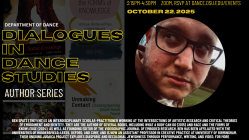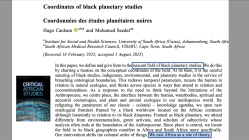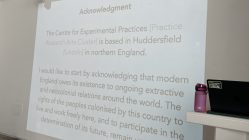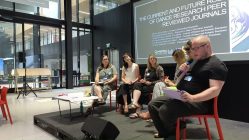Call for Proposals
EMBODIED RESEARCH WORKING GROUP
International Federation for Theatre Research
“Unstable Geographies: Multiple Theatricalities”
10-14 July 2017
São Paolo, Brazil
The Embodied Research Working Group (ERWG) supports individual and collaborative research projects in which embodied practice is an explicit and essential part of the methodology. It aims to establish an international platform through which to share innovative and traditionally informed approaches to embodied research and to explore relevant methodological, epistemological, and ontological questions. ERWG will hold its inaugural meeting at the 2017 annual conference of the International Federation for Theatre Research in São Paolo.
Proposals are invited but not required to respond to the conference subthemes: art and insurrection; territories of conviviality and confrontation; spaces of subjectivity; boundaries of history; pedagogies of crisis; relations of artistic production; spatialities of theatre and performance; flows and counterflows; and cultural violences, identities and alterities. Each proposal should explain the nature of your embodied research; the questions you are asking or the territories you are exploring; the role of embodied practice in methodology or research design; the epistemic, aesthetic, social, or other implications of the research; and the ways you hope to advance your research through engagement with IFTR/ERWG. Proposals should be no more than 500 words and should include a short biographical statement.
Each proposal should be directed towards one of the following thematic strands:
1) Embodied Practice: developing structures for sharing embodied knowledge and research in person during the conference sessions. Choose this strand if you want to share your research by leading an embodied workshop or practice session during the conference.
2) Multimedia Publication: investigating strategies for transmitting embodied research through alternative modes of publication, including multimedia web platforms and video essays. Choose this strand if you want to share, discuss, and receive feedback on multimedia documents.
3) Interdisciplinary Connections: placing embodied research in an interdisciplinary context. Choose this strand if you want to draw connections between embodied research and philosophy, history, sociology, anthropology, cognitive studies, gender, critical race, (dis)ability studies, or other fields in which the body is foregrounded.
4) Institutional Frameworks: examining diverse institutional models for the development and dissemination of embodied research such as universities, schools, professional training associations, or health/medicine. Choose this strand if you want to engage with the social, economic, vocational, and other institutional dimensions of embodied research.
Please indicate in your proposal which strand you would like to be part of. The four strands will be used to create subgroups within ERWG which will collectively plan the format of the conference sessions. They may also be used to coordinate additional activities taking place between the annual conferences. If your proposal cannot be accommodated within the strand you request, it may be moved to a different strand or forwarded to another working group or to the conference organizers for possible placement elsewhere.
Proposals must be submitted through the IFTR registration process by 31 January 2017. After you submit your abstract through IFTR, please email a copy to the convener at the address below.
If there is a high volume of proposals, the main criterion for selection will be the centrality or otherwise innovative role of embodied practice in the research methodology. Priority will also be given to proposals that contribute to the geographic, cultural, and disciplinary diversity of ERWG.
Convener
Ben Spatz
b.spatz@hud.ac.uk
University of Huddersfield
IFTR bursary information
https://www.iftr.org/news/2016/november/iftr-conference-2017-sao-paulo-bursary-application
IFTR registration at Cambridge Journals Online
http://journals.cambridge.org/iftr
IFTR abstract submission at Cambridge Journals Online
http://www.cambridge.org/gb/academic/abstract-submission-form-iftr-2017-conference






